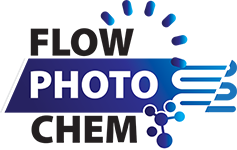 FlowPhotoChem partner eChemicles is part of a league of green companies capturing greenhouse gas and industrial emissions and reducing fossil fuel dependency to generate useful chemicals and materials. The company is focusing on developing and bringing groundbreaking electrolyser technologies to the market, that enable the chemical industry to profitably reduce its environmental impact. eChemicles’s mission is to develop innovative sustainable electrolyser solutions to drive the transition of the chemical industry and to reduce its environmental impact in a profitable way.
FlowPhotoChem partner eChemicles is part of a league of green companies capturing greenhouse gas and industrial emissions and reducing fossil fuel dependency to generate useful chemicals and materials. The company is focusing on developing and bringing groundbreaking electrolyser technologies to the market, that enable the chemical industry to profitably reduce its environmental impact. eChemicles’s mission is to develop innovative sustainable electrolyser solutions to drive the transition of the chemical industry and to reduce its environmental impact in a profitable way.
Danielle Nicholson at Pintail Limited pitched a series of questions to Dr Tamás Födi and Krisztina Sebők-Robert at eChemicles.
How many people are employed at eChemicles? Give a breakdown of technical and administrative employees, if possible.
eChemicles currently has 25 full-time employees, consisting of engineering, business and operative personnel.
Describe the facility and any specialised equipment. Where are you located?
eChemicles is located in Szeged in southern Hungary. At present, testing and measurements are taking place in 4 laboratories.
Why is eChemicles an exciting place to work?
eChemicles is highly engaged in different innovative and R&D heavy projects, developing a scalable low-temperature electrochemical technology, providing a stimulating environment for professional growth.
Can you briefly describe the electrolysers that eChemicles produce and what they can be used for?
We have developed the world's best-performing low-temperature electrochemical technology that can be coupled with renewable energy to convert CO2 into synthetic chemicals in a carbon-neutral or even negative way. Our technology focuses on carbon monoxide (CO) as the first target product. As the next step, we also develop a follow-up CO reduction technology, which allows us to tap into other chemical markets, such as plastics, through ethylene production.
Flowing continuously for 24 hours, roughly how much CO2 is captured and how much CO can be produced from the eChemicles electrolyser?
In our first prototype system, we are targeting 303 kg/day CO2 conversion capacity, which translates to roughly 193 kg/day CO as a product.
What are the most pressing challenges with mass scale-up of the technology?
Validation of the supplied materials and parts is always challenging in technologization. Additionally, the development of partnerships is extremely important in our case to learn real industry needs both from the CO2 capture side and also from the CO end-user side.
Where do you see the most future potential?
New cell component manufacturing processes can result in a significant decrease both in stack production cost and environmental impact. Also with improved membrane electrode assembly manufacturing processes and components, we are expecting longer lifetime, lower iridium loading and lower cell potentials.
Who makes up your customer base? Mainly other industries? Academic research groups? Or a mixture?
Different use cases are identified for a diverse set of non-exclusive markets. The technology can be tailored to different market needs, with the opportunity for quick entry to CO production as an industrial gas, focusing on end users who aim to produce CCU products, serving industries like fine chemicals and bulk chemicals later on, and even contributing to the market of sustainable fuels on the long run.
Can you briefly describe your role in the FlowPhotoChem project?
Primarily, eChemicles takes part as a reactor designer and scale-up partner. Additionally, we are also involved in system integration and techno-economic evaluation of the integrated system.
Why are research projects like FlowPhotoChem important for successful companies like eChemicles?
In this way, eChemicles will get even better integrated into the electrochemical and catalysis communities and will be aware of the most recent scientific trends.
What value do academic collaborations add to the business?
Joint developments with academic consortium partners bring up-to-date knowledge in-house and create opportunities for strong collaborations. Within our university partnerships, we are aiming to bring revolutionary ideas to market by using these partnerships as either a technology testbed or as a sounding board for new product ideas.
In eChemicles’ research into waste-to-wealth technologies, what has been the most interesting/surprising, unexpected outcome? A discovery? A setback?
Humidification of dry CO2 and its control measurement can be surprisingly challenging between lab and pilot plant scale.
Our low temperature electrolyser technology is surprisingly robust against pressure and temperature fluctuations. Also, we were able to demonstrate that dynamic voltage variation can be tolerated by the electrolyser.[1]


